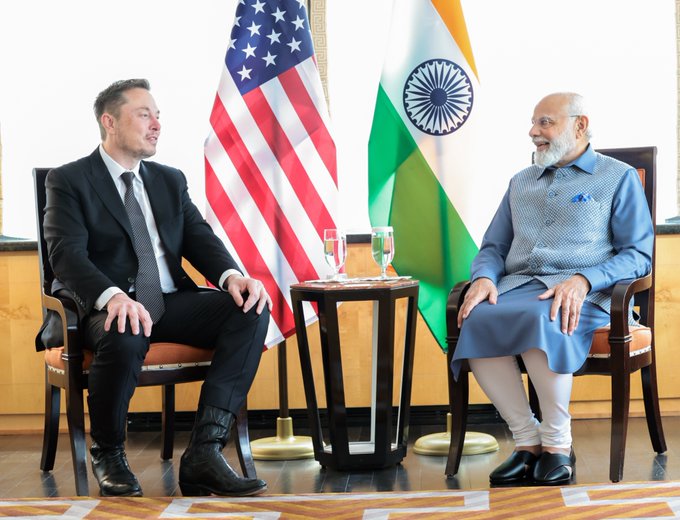In a prolonged game of negotiations spanning three years, Tesla and India find themselves in a challenging standoff, each vying for the upper hand. The desire for collaboration, fueled by indications from CEO Elon Musk and Prime Minister Narendra Modi, centers on Tesla’s ambition to establish a manufacturing plant in India. However, hurdles involving import duties on vehicles and the ‘Make in India’ campaign have created a complex scenario.


Tesla’s Desire to Test Waters: Assessing Market Demand
While not opposed to domestic manufacturing, Tesla has cautiously tested the market by importing vehicles from China and Germany. This move, however, clashes with India’s emphasis on promoting local manufacturing and its imposition of a 100 percent import tax on vehicles priced above $40,000.
India’s Stance: Playing Hardball on Import Duties and Local Investment
India, adamant about not allowing imported vehicles, especially from China and Germany, has stood firm on its policy of imposing hefty import duties. This has led to a protracted negotiation where the Indian government demands Tesla’s commitment to a local manufacturing plant before considering any concessions on import duties.
Current Government Position: A Stalemate Persists
According to Junior Minister Som Parkash, “Presently, there is no proposal either to provide an exemption from local value addition cost or to provide a subsidy on the import duty on electric vehicles in India.” This statement underscores the entrenched position, prolonging the standoff.
Tesla’s Confidence in India: A Future Investment
Despite the challenges, Elon Musk remains optimistic about Tesla’s future in India. He stated earlier this year, “I am confident Tesla will be in India, and we’ll do so as soon as humanly possible.”
Conclusion
As Tesla and India grapple with the intricacies of international business, the clash of interests in this negotiation signifies more than a business deal; it shapes the future of electric vehicle manufacturing in India. The outcome will serve as a case study in addressing challenges posed by import duties, promoting local industries through the ‘Make in India’ campaign, and fostering international collaborations in the dynamic landscape of electric vehicles.
ALSO READ :-
Tesla’s Autopilot Recall Extends to Canada, 193,000 Vehicles Affected
Tesla Giga Mexico Secures $153 Million Incentives in Nuevo León
SOURCE : TESLARATI
FAQs
Why does India oppose importing vehicles from China and Germany?
India emphasizes domestic manufacturing and aims to boost local industries, aligning with the ‘Make in India’ campaign.
What import duties does India impose on vehicles?
India imposes a 100 percent import tax on cars priced over $40,000, creating a significant challenge for international automakers like Tesla.
Why is Tesla hesitant to commit to building a plant in India immediately?
Tesla aims to gauge market demand before investing in a local manufacturing plant, leading to negotiations on concessions for import duties.
What are the challenges in importing vehicles into India, particularly those priced above $40,000?
India imposes a 100 percent import tax on cars exceeding $40,000, doubling their cost. This policy complicates the entry of high-priced vehicles into the Indian market.
Why is the Indian government hesitant to provide concessions on import duties for electric vehicles?
The Indian government insists on a commitment to local manufacturing before considering any concessions on import duties. This stance is aligned with their emphasis on promoting domestic industries.
How does the ‘Make in India’ campaign influence the negotiations between the parties?
The ‘Make in India’ campaign, aimed at encouraging domestic manufacturing, contributes to the complexity of negotiations by emphasizing the importance of local production over the import of vehicles.
What role does market demand play in shaping the decision-making process for foreign companies looking to establish manufacturing plants in India?
Foreign companies, when contemplating local manufacturing, often seek to assess market demand before making substantial investments. This consideration adds a layer of complexity to negotiations with the Indian government.
